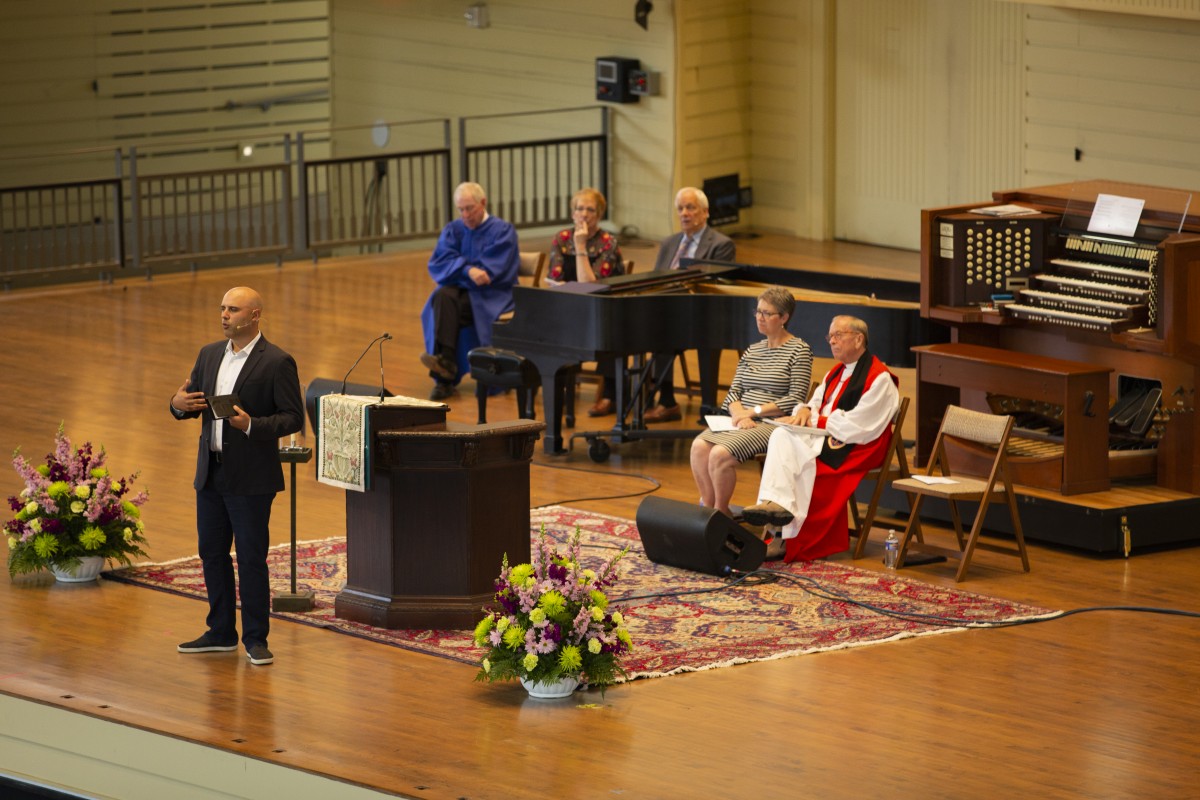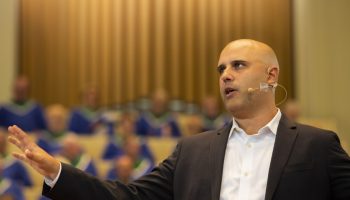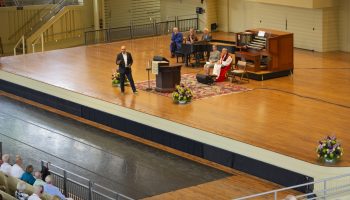
In the 1930s, as war approached in Europe, a group of artists would meet and the convener would ask the group, “How can we think about planting roses while the world burns?”
“I think there is one calling that is underplayed: the calling of the artist to cultivate beauty,” the Rev. Skye Jethani said.
Jethani was preaching at the 9:15 a.m. Wednesday morning service of worship on Aug. 1 in the Amphitheater. His sermon title was “Planting Roses as the World Burns,” and the Scripture text was Matthew 26:6-13, the woman with the alabaster jar.
On Tuesday, Jethani talked about the theology of vocation. He said that is not your circumstances or your kind of work that makes work meaningful, but it is how you walk “with the One who makes all things sacred” that gives your work meaning.
Many people say they have no artistic ability, but Jethani challenged that assumption.
“We are created by a creative God who calls us to cultivate beauty,” he said. “We have to challenge injustice, to see beyond the useful.”
In the story in Matthew, the disciples were horrified that the woman wasted an expensive ointment on Jesus when it could have been sold and the money given to the poor.
“Jesus rebuked them,” Jethani said, “because they could not see beyond the practical, they could not see the value of the beautiful.”
The woman’s act had value because of its wastefulness. Jesus said that the story of her act would be told “in remembrance of her. She is remembered for being impractical,” Jethani said.
He said our world is more like the world of the disciples than we might like.
“We view the world through the lens of practicality,” he told the congregation. “We cast things aside when they are no longer useful. This spills over into looking at people for their utility and not their inherent value.”
There are 27 million people who live in slavery today, Jethani said, more than at any time in history, because they are only viewed for their utility.
“The divisions in our culture are deep, wide and legitimate,” he said. “But now we view people not only as wrong, but worthless. We believe this would be a better place if they were not here.”
When looking at Jesus’ teachings, it is clear that God not only created things to be useful but to be beautiful.
In Genesis 2:9, God “made to grow every tree that is pleasant to the sight and good for food.” In ancient Hebrew, the ordering of the list is important, Jethani said. “God put beauty ahead of the useful.”
Human beings flourish when they engage in the beautiful and impractical, when they behold beauty and not just see usefulness.
Christian worship should be magnificent and beautiful, but too many Christians approach worship as engaging God in a practical transaction to have their dreams and desires fulfilled and lives fixed, Jethani said.
“A pastor friend said that his congregation sees Jesus as a duct tape-WD40 combo pack,” he said. “In fact, in Finland the word for duct tape is Jesus tape.”
The transaction occurs when people approach worship as an exchange: I will pray and sing the hymns, and the sermon better give me something that will improve my life, not just worship God.
There was an NFL player, a wide receiver on a team that plays not far from here, Jethani said, who during a playoff game dropped a pass in the end zone. After the game, he tweeted, “I praise you 24/7 and this is what you do for me? I will never forget this, ever.”
“This is the transaction: I will praise you, and you will help me catch footballs,” Jethani said.
To worship, he said, is to ascribe intrinsic worth and value.
“Worship should help us see more clearly the goodness, beauty and power of God,” he said.
In Psalm 27, David asked to live in the house of the Lord all his life and to behold the beauty of the Lord.
“True worship seeks nothing in return except God,” Jethani said. “We have to unleash artists to do their creative work in an unfettered way.”
During the Cold War, there was a minister of culture in the Soviet Union named Alexander Dymschitz. He found the most gifted artists and paid them more and gave them better housing.
Dymschitz had only one rule — there could be no abstract art because it had no clear meaning or interpretation; it was not useful to the state.
“There was not art for art’s sake that could soar into the spiritual realm,” Jethani said. “Dymschitz was only interested in propaganda.”
He said “our culture and our churches are full of Dymschitzs,” those “who only value art for its utilitarian value, as long as it is nonpolitical and is practical.”
“Beauty is the prerequisite to social justice; it promotes value that is not just useful,” Jethani said.
If value is only rooted in the practical, it is easy to take away the right to vote, citizenship, even the right to life. The great gift of artists, he said, is to show us that everyone has inherent value, and we need to release them to do that.
Some critics look at the churches and think that they waste money on impractical things. Jethani paraphrased Jesus: “Leave them alone, they have done a beautiful thing.”
During the bombing of Sarajevo in 1992, cellist Vedran Smailovic played Albinoni’s Adagio in G Minor in bombed- out buildings and craters to protest against the bombing.
Jethani said that Smailovic played for 22 days in one crater after a bakery had been bombed and 22 people died waiting for bread. He played at funerals and in the streets and, in spite of the dangers, was never harmed.
“The beauty of the music repelled the violence,” Jethani said.
When a reporter asked Smailovic if he was crazy, playing in such dangerous places, he replied, “Why don’t you ask if they are crazy for bombing Sarajevo?”
“War is the most practical thing we humans do; we don’t care what the cost is,” Jethani said. “Art is the opposite. It brings order, beauty and creation. In the midst of brokenness, a simple display of beauty reminds us of a higher calling.”
Those artists in the 1930s had a response to the question “How can we think of planting roses while the world burns?”
“How can we not plant roses?” they said.
Hope, Jethani said, mobilizes us to action, but “don’t lose sight of the impractical. It is what grounds us to the creator, God.”
The Rev. Carmen Perry presided. The Rev. Sarah James, a retired minister and guitarist who plays at 2 Ames on Thursdays, read the Scripture. Jared Jacobsen, organist and coordinator of worship and sacred music, directed the Motet Choir in “Steal Away” by Gwyneth Walker. The Randell-Hall Memorial Chaplaincy and the Geraldine M. and Frank E. McElree Jr. Chaplaincy Fund provide support for this week’s services.




